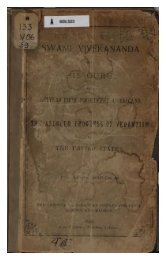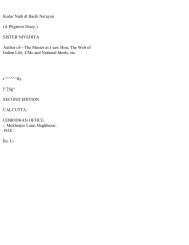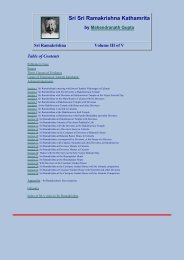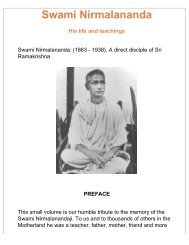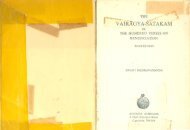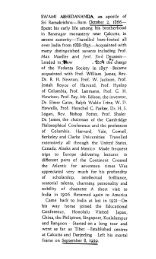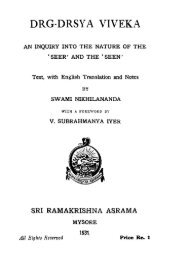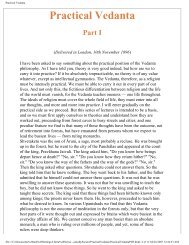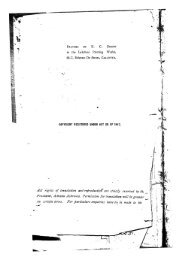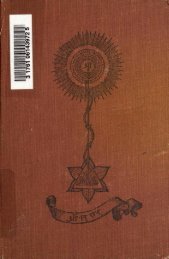Swami Vivekananda - A Biography by Swami Nikhilananda
Swami Vivekananda - A Biography by Swami Nikhilananda
Swami Vivekananda - A Biography by Swami Nikhilananda
You also want an ePaper? Increase the reach of your titles
YUMPU automatically turns print PDFs into web optimized ePapers that Google loves.
<strong>Vivekananda</strong>.<br />
The <strong>Swami</strong>'s mission was both national and international. A lover of mankind, he<br />
strove to promote peace and human brotherhood on the spiritual foundation of the<br />
Vedantic Oneness of existence. A mystic of the highest order, <strong>Vivekananda</strong> had a<br />
direct and intuitive experience of Reality. He derived his ideas from that unfailing<br />
source of wisdom and often presented them in the soul-stirring language of poetry.<br />
The natural tendency of <strong>Vivekananda</strong>'s mind, like that of his Master, Ramakrishna, was<br />
to soar above the world and forget itself in contemplation of the Absolute. But another<br />
part of his personality bled at the sight of human suffering in East and West alike. It<br />
might appear that his mind seldom found a point of rest in its oscillation between<br />
contemplation of God and service to man. Be that as it may, he chose, in obedience to<br />
a higher call, service to man as his mission on earth; and this choice has endeared him<br />
to people in the West, Americans in particular.<br />
In the course of a short life of thirty-nine years (1863-1902), of which only ten were<br />
devoted to public activities — and those, too, in the midst of acute physical suffering<br />
— he left for posterity his four classics: Jnana-Yoga, Bhakti-Yoga, Karma-Yoga, and<br />
Raja-Yoga, all of which are outstanding treatises on Hindu philosophy. In addition, he<br />
delivered innumerable lectures, wrote inspired letters in his own hand to his many<br />
friends and disciples, composed numerous poems, and acted as spiritual guide to the<br />
many seekers who came to him for instruction. He also organized the Ramakrishna<br />
Order of monks, which is the most outstanding religious organization of modern India.<br />
It is devoted to the propagation of the Hindu spiritual culture not only in the <strong>Swami</strong>'s<br />
native land, but also in America and in other parts of the world.<br />
<strong>Swami</strong> <strong>Vivekananda</strong> once spoke of himself as a 'condensed India.' His life and<br />
teachings are of inestimable value to the West for an understanding of the mind of<br />
Asia. William James, the Harvard philosopher, called the <strong>Swami</strong> the 'paragon of<br />
Vedantists.' Max Müller and Paul Deussen, the famous Orientalists of the nineteenth<br />
century, held him in genuine respect and affection. 'His words,' writes Romain Rolland,<br />
'are great music, phrases in the style of Beethoven, stirring rhythms like the march of<br />
Handel choruses. I cannot touch these sayings of his, scattered as they are through the<br />
pages of books, at thirty years' distance, without receiving a thrill through my body like<br />
an electric shock. And what shocks, what transports, must have been produced when in<br />
burning words they issued from the lips of the hero!'<br />
EARLY YEARS<br />
<strong>Swami</strong> <strong>Vivekananda</strong>, the great soul loved and revered in East and West alike as the<br />
rejuvenator of Hinduism in India and the preacher of its eternal truths abroad, was born<br />
at 6:33, a few minutes before sunrise, on Monday, January 12, 1863. It was the day of<br />
the great Hindu festival Makarasamkranti, when special worship is offered to the



